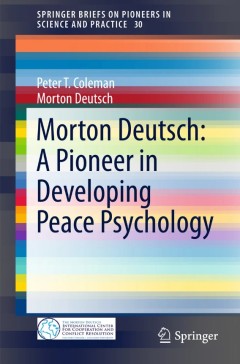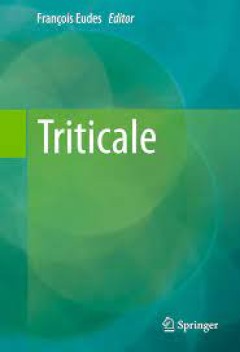Filter by

Morton Deutsch: A Pioneer in Developing Peace Psychology
Commemorating Morton Deutsch’s 95th birthday, this book presents ten major texts by this highly respected social psychologist on war and peace. This first volume presents Deutsch in his role as a leading social science activist on issues of war and peace – writing papers, making speeches and participating in demonstrations. After serving in the U.S. Air Force during World War II and being a…
- Edition
- 1
- ISBN/ISSN
- 978-3-319-15439-8
- Collation
- XVI, 139
- Series Title
- SpringerBriefs on Pioneers in Science and Practice
- Call Number
- -

Modern Techniques and Solvents for the Extraction of Microbial Oils
A valuable reference presenting many processes that facilitate lipid extraction from micro-organisms. Amongst the techniques included are Folch, Bligh and Dyer methods, and the Soxhlet technique as well as intensified green processes (ultrasound, microwave, supercritical fluid extraction, agro-solvent, accelerated solvent extraction, enzyme-assisted extraction, instant controlled pressure drop,…
- Edition
- 1
- ISBN/ISSN
- 978-3-319-22716-0
- Collation
- XII, 52
- Series Title
- SpringerBriefs in Molecular Science
- Call Number
- -

Triticale
Triticale crop species has received substantial research support since the mid-20th century making it a commercial success in many countries, in diverse value propositions. However, no recent book captures the new knowledge and progresses made in more than 2 decades. The purpose of this work is to review and collate the new knowledge of triticale plant biology and agronomy, while considering th…
- Edition
- 1
- ISBN/ISSN
- 978-3-319-22551-7
- Collation
- XI, 258
- Series Title
- -
- Call Number
- -

Trends in Practical Applications of Scalable Multi-Agent Systems, the PAAMS C…
Latest research trends in Practical Applications Scalable Multi-Agent System Results of the workshops of the 14th International Conference on Practical Applications of Agents and Multi-Agent Systems (PAAMS 2016) held in Sevilla, Spain, from 1st to 3rd June 2016 Brings together researchers and developers articles from industry and the academic world reporting on the latest scientific and technic…
- Edition
- 1
- ISBN/ISSN
- 978-3-319-40159-1
- Collation
- XVIII, 400
- Series Title
- Advances in Intelligent Systems and Computing
- Call Number
- -

Trends in Practical Applications of Scalable Multi-Agent Systems, the PAAMS C…
Latest research trends in Practical Applications Scalable Multi-Agent System Results of the workshops of the 14th International Conference on Practical Applications of Agents and Multi-Agent Systems (PAAMS 2016) held in Sevilla, Spain, from 1st to 3rd June 2016 Brings together researchers and developers articles from industry and the academic world reporting on the latest scientific and techni…
- Edition
- 1
- ISBN/ISSN
- 978-3-319-40159-1
- Collation
- XVIII, 400
- Series Title
- Advances in Intelligent Systems and Computing
- Call Number
- -

Trends in Practical Applications of Agents, Multi-Agent Systems and Sustainab…
Results of the workshops of the 13th International Conference on Practical Applications of Agents and Multi-Agent Systems (PAAMS 2015) held in Salamanca, Spain, from 3rd to 5th June 2015 Brings together researchers and developers articles from industry and the academic world reporting on the latest scientific and technical advances on the application of multi-agent Systems Written by experts …
- Edition
- 1
- ISBN/ISSN
- 978-3-319-19629-9
- Collation
- XVI, 242
- Series Title
- Advances in Intelligent Systems and Computing
- Call Number
- -

Trends and Applications in Knowledge Discovery and Data Mining PAKDD 2015 Wor…
- Edition
- 1
- ISBN/ISSN
- 978-3-319-25660-3
- Collation
- XV, 289
- Series Title
- Lecture Notes in Computer Science
- Call Number
- -
- Edition
- 1
- ISBN/ISSN
- 978-3-319-25660-3
- Collation
- XV, 289
- Series Title
- Lecture Notes in Computer Science
- Call Number
- -

Evacuation Modeling Trends
This book presents an overview of modeling definitions and concepts, theory on human behavior and human performance data, available tools and simulation approaches, model development, and application and validation methods. It considers the data and research efforts needed to develop and incorporate functions for the different parameters into comprehensive escape and evacuation simulations, wit…
- Edition
- -
- ISBN/ISSN
- 978-3-319-20708-7
- Collation
- VII, 133
- Series Title
- -
- Call Number
- -

Transitions in Mathematics Education
This book examines the kinds of transitions that have been studied in mathematics education research. It defines transition as a process of change, and describes learning in an educational context as a transition process. The book focuses on research in the area of mathematics education, and starts out with a literature review, describing the epistemological, cognitive, institutional and socioc…
- Edition
- 1
- ISBN/ISSN
- 978-3-319-31622-2
- Collation
- X, 34
- Series Title
- ICME-13 Topical Surveys
- Call Number
- -

Media Literacy Education in China
Dr. C.K. Cheung teaches at the Faculty of Education, University of Hong Kong. He has published more than 30 externally refereed articles and book chapters in the field of media literacy education. He has been successful in getting both internal and external research grants. In 2006, he was awarded the most competitive research grant (CERG) to look at the implementation of media education in Hon…
- Edition
- 1
- ISBN/ISSN
- 978-981-10-0043-0
- Collation
- XII, 179
- Series Title
- -
- Call Number
- -
 Computer Science, Information & General Works
Computer Science, Information & General Works  Philosophy & Psychology
Philosophy & Psychology  Religion
Religion  Social Sciences
Social Sciences  Language
Language  Pure Science
Pure Science  Applied Sciences
Applied Sciences  Art & Recreation
Art & Recreation  Literature
Literature  History & Geography
History & Geography